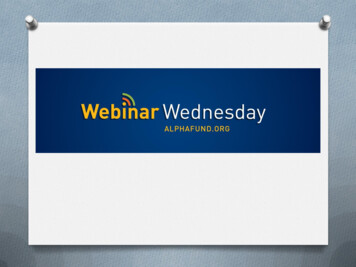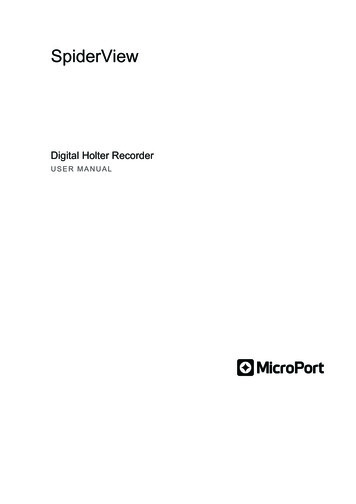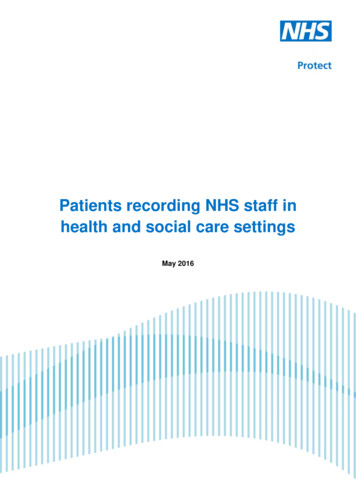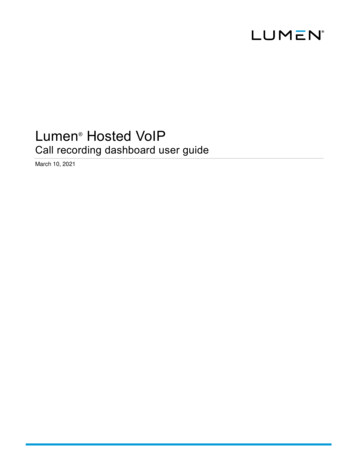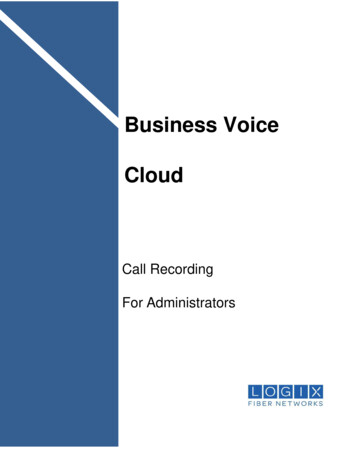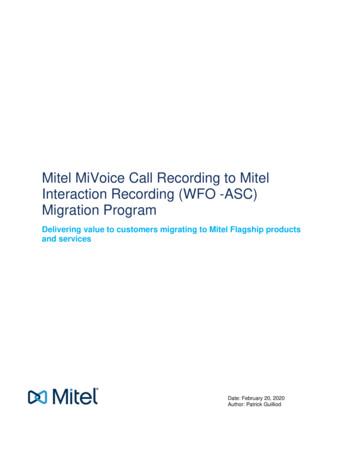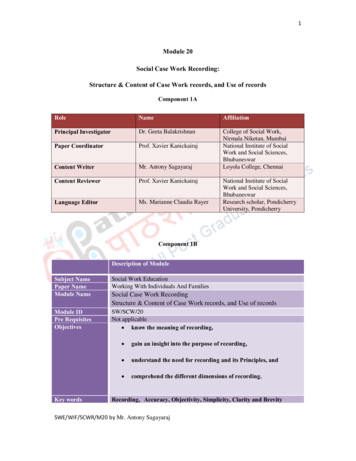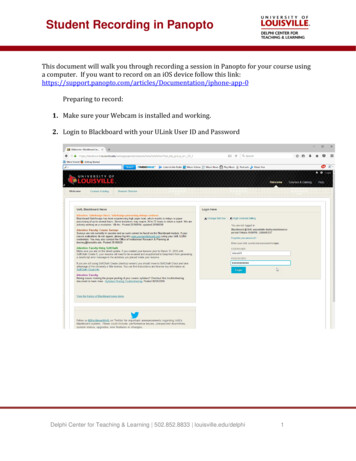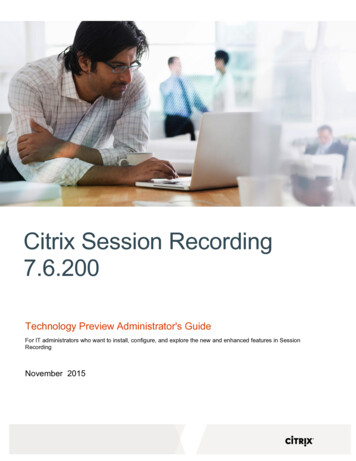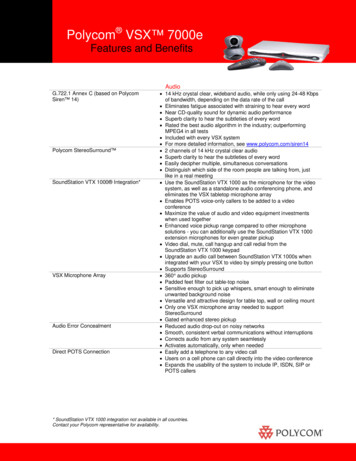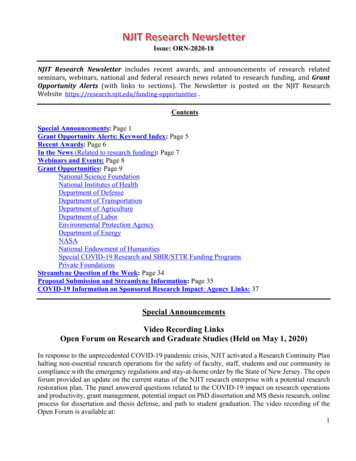
Transcription
Issue: ORN-2020-18NJIT Research Newsletter includes recent awards, and announcements of research relatedseminars, webinars, national and federal research news related to research funding, and GrantOpportunity Alerts (with links to sections). The Newsletter is posted on the NJIT ResearchWebsite https://research.njit.edu/funding-opportunities .ContentsSpecial Announcements: Page 1Grant Opportunity Alerts: Keyword Index: Page 5Recent Awards: Page 6In the News (Related to research funding): Page 7Webinars and Events: Page 8Grant Opportunities: Page 9National Science FoundationNational Institutes of HealthDepartment of DefenseDepartment of TransportationDepartment of AgricultureDepartment of LaborEnvironmental Protection AgencyDepartment of EnergyNASANational Endowment of HumanitiesSpecial COVID-19 Research and SBIR/STTR Funding ProgramsPrivate FoundationsStreamlyne Question of the Week: Page 34Proposal Submission and Streamlyne Information: Page 35COVID-19 Information on Sponsored Research Impact: Agency Links: 37Special AnnouncementsVideo Recording LinksOpen Forum on Research and Graduate Studies (Held on May 1, 2020)In response to the unprecedented COVID-19 pandemic crisis, NJIT activated a Research Continuity Planhalting non-essential research operations for the safety of faculty, staff, students and our community incompliance with the emergency regulations and stay-at-home order by the State of New Jersey. The openforum provided an update on the current status of the NJIT research enterprise with a potential researchrestoration plan. The panel answered questions related to the COVID-19 impact on research operationsand productivity, grant management, potential impact on PhD dissertation and MS thesis research, onlineprocess for dissertation and thesis defense, and path to student graduation. The video recording of theOpen Forum is available at:1
Download recording link:https://njit.webex.com/njit/ldr.php?RCID 1ea85c4576d24f1d9cc3690c8806ded9Streaming recording link:https://njit.webex.com/njit/lsr.php?RCID 1ea85c4576d24f1d9cc3690c8806ded9Open Forum Panel:-Fadi Deek, Provost and Senior Executive VP-Andrew Christ, Senior VP for Real Estate Development and Capital Operations-Basil Baltzis, Senior Vice Provost for Academic Affairs and Student Services-Atam Dhawan, Senior Vice Provost for Research-Sotirios Ziavras, Vice Provost for Graduate Studies & Dean of the Graduate Faculty-Eric Hetherington, Executive Director, Sponsored Research Programs Administration-Cristiana Kunyczka, Director, Office of Global InitiativesNJIT Pandemic Recovery PlanResearch Continuity Plan Update: Phased Recovery OperationsNJIT faculty, staff, and students at research facilities must follow the specific social distancing and safetyprotocols including the use of personnel protective equipment (PPE) as required by the institutional, stateand federal guidelines in the respective phase of the research continuity plan. State and nationalinformation regarding current conditions can be found at: New Jersey’s COVID-19 information hub: https://covid19.nj.gov/index.html White House Plan for Opening up America Again: 04/Guidelines-for-Opening-Up-America-Again.pdfThe following guidelines should be adapted with each respective phase for the recovery of researchoperations. We are currently in Phase 0. Based on the assessment of federal, state and local regulations,NJIT will announce the periods of subsequent phases for gradual recovery.Recovery Phase 0: All non-essential research operations halted. Essential research operations followstrictest social distancing and safety protocols with only essential staff. Safety within laboratories must be rigorously maintained with adequate access to PPE and othersafety related supplies. Labs will not be authorized for access unless adequate safety supplies areidentified as being available. PIs must identify by name the people that will be considered essentialpersonnel (including replacements/backups). During this time all essential research operations(ERO) must be approved by chair, dean, and the senior vice provost for research through theemergency research continuity plan process currently in place. Research involving human subjects that requires face-to-face interaction with human subjects ishalted. Research that can be conducted remotely should be continued to the extent possible.Recovery Phase 1: Minimal research operations approved through chairs, deans and senior vice provostfor research to pursue time-sensitive priority research such as projects related to COVID-19 response;2
approved Essential Research Operation (ERO) plans in Phase-0; long-term research experiments withcell-lines, animals, and human subjects that were already underway before Phase-0; grants and contractsexpiring within six months; submission of proposals in response to special solicitations (Requests forProposals); and projects involving students with graduation requirements. Requests for projects considered time-sensitive should be directed to departmental chairs. Thedean and senior vice provost for research will provide guidance as needed. All research operations at NJIT facilities in this phase must follow the highest possible level ofsocial distancing implemented. Research that can be conducted remotely should be continued to the extent possible.Recovery Phase 2: Most research operations, whether sponsored through external grants and contractsor internally funded, may be restarted through the approval of department chairs using significant socialdistancing and safety protocols with restrictions on the number of researchers and staff present inlaboratories at one time. The Phase 2 restart may require developing flexible work schedules, plan for supply chain issues,and prepare core and fabrication facilities in advance of need. To ensure social distancingrequirements and to reduce density of research personnel in university research spaces, the labdirectors should consider permitting flexible lab access schedules, work shifts or staggeredworkdays, and extended facilities support to enable more round-the-clock operation of researchfacilities. Under no circumstances should safety be sacrificed due to lack of adequate supplies,type, and quality of PPE. Research that can be conducted completely remotely or in addition to the on-campus operationsshould continue to be conducted in that manner.Recovery Phase 3: Most research operations on funded and unfunded projects along with researchrequired for future proposal submissions are restored with minimal social distancing and personnel safetyprotocols. Group meetings and research presentations with faculty, staff and students should be restrictedand kept to a minimal size protecting any vulnerable participants. If possible, these meetingsshould continue to be held online until we reach a state of full recovery. Other laboratory safety protocols must be strictly followed. Research that can be conducted completely remotely or in addition to the on-campus operationsshould continue to be conducted in that manner.Full Recovery: All research operations are restored fully with no specific social distancing requirmeents.However, all laboratory and personnel safety protocols must be strictly followed.This document refers to research conducted on the NJIT campus in Newark, NJ, including the physicalcampus and activities that have direct contact with individuals (human subjects) anywhere. Satellitelocations, such as the Big Bear Solar Observatory in California, must follow a similar phased approachinformed by local conditions.Guidance on Financial Management of Grants and ContractsThe Office of Management and Budget issued a memorandum on 19 March 2020 (OMB /2020/03/M-20-17.pdf) providing guidance on3
issues related to grant management during the COVID-19 disruption. This memorandum provides shortterm relief for administrative, financial management, and audit requirements under 2 CFR Part 200,Uniform Administrative Requirements, Cost principles and Audit Requirements for Federal Awards, forthe management of grants and contracts from all federal and non-federal sources under the COVID-19public health emergency without compromising federal financial assistance accountability requirements.Funding agencies such as NSF and NIH are following the OMB guidance with respect to grantmanagement during this disruption to university business and research. The OMB Memorandum M-2017 with the important information on the financial management of the research grants and contracts isposted on the research website -plan. Links to currentnotifications from federal agencies are provided below. Principal investigators should check with thewebsites of their specific funding agencies for more information.COVID-19 Information for NSF applicants and award recipients FAQ is regularly updated on thewebsite 9faqs dcl.pdf. COVID-19 Information forNIH applicants and recipients of NIH funding is regularly updated on the ters/corona-virus.htm. A multiple Funding Agencies ResearchImpact Guidance Matrix by the Council of Government Relationships is posted on the website COGR'sFederal Agency Guidance Matrix (XLS).Back to ContentsOffice of Research Administration OperationsAll Office of Research processes continue during this period of remote operation. Our hours ofusual operation remain 8:30-4:30 Monday through Friday. All staff are available by email and mosthave their office phone numbers forwarded to them through Cisco Jabber. You should receive areply to an inquiry within 24 hours. You may always reach out to your college’s research administrationsupport person for assistance.Principal investigators who have subaward activity with other institutions or contracts withindustry partners are asked to discuss the current situation with their counterparts to determine ifthe COVID-19 disruption will require a modification to our existing agreements. If it is determinedthat a modification is required, please contact Justin Samolewicz at Justin.m.samolewicz@njit.eduto discuss next steps.Budget transfers or other actions needed to comply with this guidance should follow the standardprocedures. Questions or concerns regarding post-award financial activity on grants may bedirected to your grant accountant or Mariel Diaz at mailto:mariel.diaz@njit.edu.Questions related to OMB guidance, research compliance or general concerns about the administrationand financial management of grants and contracts may be directed to Eric Hetherington, ExecutiveDirector, Sponsored Research Programs Administration at erich@njit.eduPlease also use the following group email addresses for your specific questions in the respective areas:4
Pre-Award inquiries: srard@njit.eduPost-Award financial management: gca@njit.eduInstitutional Review Board: irb@njit.eduInstitutional Biosafety Committee: ibc@njit.eduAll other research-related inquiries during the emergency should be submitted tohttps://research.njit.edu/inquiryBack to ContentsGrant Opportunity AlertsKeywords and Areas Included in the Grant Opportunity Alert Section BelowNSF: Industry-University Cooperative Research Centers Program (IUCRC); Inclusion across theNation of Communities of Learners of Underrepresented Discoverers in Engineering and Science(NSF INCLUDES); Antarctic Research; Coastlines and People (CoPe); NSF Program on Fairness inArtificial Intelligence in Collaboration with Amazon (FAI)NIH: NIH Small Research Grant Program (R03); NIH Exploratory/Developmental ResearchGrant Program (R21); NIH Research Project Grant (R01); Notice of Special Interest (NOSI): DataDriven Research on Coronavirus Disease 2019 (COVID-19) (R21); Emergency Awards: RapidInvestigation of Severe Acute Respiratory Syndrome Coronavirus 2 (SARS-CoV-2) and CoronavirusDisease 2019 (COVID-19) (R21); Superfund Research Program Occupational Health and SafetyEducation Programs on Emerging Technologies (R25); Institutional Development Award (IDeA)Networks for Clinical and Translational Research (IDeA-CTR) (U54)Department of Defense/US Army/DARPA/ONR: DoD Hearing Restoration Focused ResearchAward; DoN Science, Technology, Engineering & Mathematics (STEM), Education and WorkforceProgram; DoD, Breast Cancer, Innovator Award; DoD Multiple Sclerosis, Investigator- InitiatedResearch Award; Biological Technologies; PRMRP Investigator-Initiated Research Award for EmergingViral Diseases and Respiratory Health; UNITED STATES MILITARY ACADEMY Broad AgencyAnnouncementDepartment of Transportation: UTC PROGRAM TIER 1 COMPETITION 2020Department of Agriculture: Distance Learning and Telemedicine Grants; Biotechnology RiskAssessment Grants Program; REAP-Renewable Energy Systems and Energy Efficiency ImprovementsDepartment of Labor: Youth Apprenticeship Readiness Grant ProgramEPA: Assessment Tools for Biotechnology Products; National Environmental Education and TrainingProgramDepartment of Energy: Notice of Intent to Issue Funding Opportunity Announcement No. DEFOA-0002252; Artificial Intelligence and Decision Support for Complex Systems; Novel Research andDevelopment for the Direct Capture of Carbon Dioxide from the AtmosphereNASA: ROSES 2020: The New (Early Career) Investigator Program in Earth Science; Early StageInnovations (ESI); National Space Grant College and Fellowship Program: Program-LevelIndependent Evaluation Opportunity; Advanced Component Technology; Living With a Star Science;ROSES 2020: Space Weather Science Application Operations-to-Research; Heliophysics SupportingResearch; HELIOPHYSICS - Early Career Investigator Program; Astrophysics Research and AnalysisNational Endowment of Humanities: Research and Development; Advanced Topics in the DigitalHumanities; Fellowships5
Special COVID-19 Research and SBIR/STTR Funding Programs: NIBIB RADx and DoDSBIR/STTR ProgramsPrivate Foundations: Brain Health Foundation: 2021 Scientific Innovations AwardFacebook: Facebook ResearchBack to ContentsRecent Research Grant and Contract AwardsCongratulations to faculty and staff on receiving research grant and contract awards!PI: James Geller (PI), Donghee Wohn (Co-PI) and Michael Lee (Co-PI)Department: Computer ScienceGrant/Contract Project Title: Northeastern - Diversity in ComputingFunding Agency: Northeastern UniversityDuration: 02/19/20-02/18/22PI: Kurt Rohloff (PI)Department: Cybersecurity CenterGrant/Contract Project Title: Verona HectorFunding Agency: IARPADuration: 06/03/19-06/02/20PI: Alexander Haimovich (PI)Department: Electrical and Computer EngineeringGrant/Contract Project Title: Noise Waveforms for Next Generation Fuze RADARFunding Agency: U.S. Department of Defense (DOTC)Duration: 08/15/17-08/14/20PI: Suzanne Berliner-Heyman (PI)Department: CPCPGrant/Contract Project Title: UNITE 2020 ProgramFunding Agency: U.S. Department of Army (AEOP)Duration: 03/01/20-02/28/21PI: Jacob Chakareski (PI)Department: Informatics (Correction)Grant/Contract Project Title: Automated Orientation & Mobility Training in Virtual Reality for LowVision RehabilitationFunding Agency: NIHDuration: 01/01/20-06/30/20Back to Contents6
In the News (National and Federal News Related to Research Funding and Grant Opportunities)Phase Four COVID-19 Relief and Stimulus Legislative Recommendations to Sustain ResearchUniversities and the Government-University Partnership: America’s leading research universities areat the forefront of the fight against the COVID-19 pandemic. They are developing and administering newdiagnostic tests, researching potential treatments and vaccines, and developing new, affordable, and easilymass-produced ventilators and personal protective equipment. The Association of American Universitiesis calling on Congress to provide 26 billion more to the major research agencies--National Institutes ofHealth, National Science Foundation, Department of Energy, Department of Defense Science &Technology programs, NASA, USDA, NOAA, National Institute of Standards and Technology, theInstitute for Education Sciences, and others. The money would cover: requests for research grant andcontract supplements (i.e., cost extensions) arising from COVID-19 related impact; emergency relief tosustain research support personnel and base operating costs for core research facilities and user-fundedresearch services until the facilities can reopen and research activities can return to pre-pandemic activitylevels; and additional graduate student and postdoc fellowships, traineeships, and research assistantshipsfor up to two years. The group also seeks regulatory and audit flexibility for researchers during thepandemic period and for a year afterwards. The letter dated May 4, 2020 is posted on the -Files/AAU Phase 4 Stimulus Proposal 5 4 2020.pdfNIH Initiates New COVID-19 Research Funding Program : So predicts Francis Collins, director ofthe National Institutes of Health, of the shark-tank-style competition under way to develop rapid,inexpensive tests for COVID-19. Recent stimulus legislation provided 1.5 billion for the effort. Of thatamount, 500 million went to the National Institute of Biomedical Imaging and Bioengineering"to accelerate research, development, and implementation of point of care and other rapid testingrelatedtocoronavirus"and 1billiontoCollins'soffice "to develop, validate, improve, and implement testing and associated technologies; to accelerate research, development, and implementation of point of care and other rapid testing; and for partnerships with governmental and non-governmental entities." Testifying before the SenateHealth, Education, Labor, and Pensions Committee, Collins said an expert review team has identified 20"applications that are ready to move into that first phase of intense scrutiny." Roll Call reports: "Finalistswill be matched with business and manufacturing partners, with a goal of distributing millions of newrapid tests by the end of summer or early fall." Read more in Roll Call; and STAT and on the agencywebsite . Also, information about NIBIB’s RADx funding program is provided in the Newsletter belowand also posted on https://www.poctrn.org/radx.NSF Industry-University Cooperative Research Centers (IUCRCs): National Science Foundationsays in a new solicitation. " Industry-University Cooperative Research Centers (IUCRCs) help industrypartners and government agencies connect directly and efficiently with university researchers to achievethree primary objectives: 1) Conduct high-impact research to meet shared and critical industrial needs incompanies of all sizes; 2) Enhance U.S. global leadership in driving innovative technology development,and 3) Identify, mentor and develop a diverse, highly skilled science and engineering workforce." Learnmore. See FAQs; Join a webinar.DOD Basic Research: Prepared testimony submitted by the Coalition for National Security Researchsays the Pentagon's FY 2021 budget "harms DoD’s ability to build capacity in its research programs andworkforce by proposing to eliminate funding for efforts such as Defense Established Programs to7
Stimulate Competitive Research (DEPSCoR)." The CNSR document also says "University ResearchInitiatives (URIs) would be absolutely devastated from funding levels proposed in the FY 2021 budget."Within the URI programs, the budget "proposes to fund the Multidisciplinary University ResearchInitiative (MURI) program and Defense University Research Instrumentation Program (DURIP) belowFY 2010 levels in real dollars."Back to ContentsWebinar and EventsEvent: Engineering for Civil Infrastructure WebinarSponsor: ASES WebinarWhen: May 11, 2020 1:00 PM – 3.00 PMWebsite: https://www.nsf.gov/events/event summ.jsp?cntn id 300452&org NSFBrief Description: The Engineering for Civil Infrastructure webinar will introduce and answer questionsrelated to NSF’s Engineering for Civil Infrastructure (ECI) program on Monday, May 11, 2020, from1:00 pm to 3:00 pm EDT.The ECI program is a core, unsolicited research program in the NSF Division of Civil, Mechanical andManufacturing Innovation, Directorate for Engineering. Program Directors will discuss recent revisionsin the program scope and new research thrusts within the ECI oomwebinarat: https://nsf.zoomgov.com/webinar/register/WN Si7IAsmfQSeorgvbSQmlSgEvent: NSF CAREER Program WebinarWhen: May 13, 2020 2:00 PM – 4.00 PMWebsite: https://www.nsf.gov/events/event summ.jsp?cntn id 300458&org NSFBrief Description: This webinar will provide information on the NSF Faculty Early Career Developmentprogram (CAREER) solicitation NSF 20-525 on Wednesday, May 13, 2020, starting at 2:00 pm EasternDaylight Time.The webinar will include a briefing on the CAREER program and key solicitation requirements followedby a question and answer session.We encourage participants to submit questions before the webinar using theemail careerwebinarqs@nsf.gov. Questions will be taken during the webinar as narat https://nsf.zoomgov.com/webinar/register/WN 64qt 7leSUqXLwr4oJrgRQ After registering, youwill receive a confirmation email containing information about joining the webinar.Event: DEB Virtual Office Hour: CAREERWhen: May 18, 2020 1:00 PM – 2.00 PMWebsite: https://www.nsf.gov/events/event summ.jsp?cntn id 300500&org NSFBrief Description: Join us May 18th from 1pm-2pm EDT for DEB’s next Virtual Office Hour. ProgramOfficers will provide an introduction to the Faculty Early Career Development Program (CAREER) (NSF20-525). Please note that this is a different date than our normally scheduled office hour.Representatives from each of the four DEB core programs will be available for questions. Questions canbe on any DEB topic.Please use the registration link below to participate. Upcoming DEB Virtual Office Hours are announcedahead of time on DEBrief, so sign up for blog notifications for reminders.8
To Join the Webinar: Register in advanceat https://nsf.zoomgov.com/webinar/register/WN E9ZWEGdFTlC1Tkr-F0YgZAEvent: IUCRC Solicitation WebinarSponsor: ASES WebinarWhen: May 19, 2020 2:00 PM – 4.00 PMWebsite:https://www.nsf.gov/events/event summ.jsp?cntn id 300541&WT.mc id USNSF 13&WT.mc ev clickBrief Description: The NSF Industry-University Cooperative Research Centers (IUCRC) program willhost a webinar about the new IUCRC funding announcement (solicitation 20-570).Changes to the program include a new Phase II funding model, centralized coordination and managementof multi-site Centers, and two membership levels.To Join the Webinar: REGISTER HEREEvent: Webinar: Maximizing Resources and Technologies for 100% Renewable EnergySponsor: ASES WebinarWhen: May 27, 2020 2:00 PM - 3:00 PM EDTWebsite: 82493833486Brief Description: The ASES May Webinar will feature a presentation on maximizing all resources andtechnologies in order to achieve a 100% renewable energy grid given by SOLAR 20/20 Conference Chair,Scott Sklar. This webinar is directly related to the content being shared at our annual conference, SOLAR20/20: Renewable Energy Vision on June 24 and 25. Learn more and register now at ases.org/conference.To Join the Webinar: Please register at the above URL.Event: NSF Distinguished Lecture Series in Mathematical and Physical Sciences for 2019-20Sponsor: NSFWhen: Various; Please see below.Website: https://www.nsf.gov/events/event summ.jsp?cntn id 299152&org NSFBrief Description: These lectures will be held at the National Science Foundation, 2415 EisenhowerAve., Alexandria, VA 22314. Advance sign-up requests are required for preparation of visitor passes byemailing the contact below. Guidelines for visiting NSF are at https://www.nsf.gov/about/visit/June 11, 2020 2:00 PM to June 11, 2020 3:00 PMTo Join the Webinar: Please register at the above URL.Back to ContentsGrant OpportunitiesNational Science FoundationGrant Program: Industry-University Cooperative Research Centers Program (IUCRC)Agency: National Science Foundation NSF 20-570RFP Website: mBrief Description: The IUCRC program provides a structure for academic researchers to conductfundamental, pre-competitive research of shared interest to industry and government organizations. These9
organizations pay membership fees to a consortium so that they can collectively envision and fundresearch, with at least 90% of Member funds allocated to the direct costs of these shared research projects.IUCRCs are formed around research areas of strategic interest to U.S. industry. Industry is defined verybroadly to include companies (large and small), startups and non-profit organizations. PrincipalInvestigators form a Center around emerging research topics of current research interest, in a precompetitive space but with clear pathways to applied research and commercial development. Industrypartners join at inception, as an existing Center grows or they inspire the creation of a new Center byrecruiting university partners to leverage NSF support. Government agencies participate in IUCRCs asMembers or by partnering directly with NSF at the strategic level.Successful IUCRCs require: A capable research/management team with an entrepreneurial mindset; Universities, faculty, and students interested in engaging in research of interest to industry; A community of industry partners seeking pre-competitive, use-inspired research projects.Each IUCRC is expected to grow and become independently sustainable by the end of the NSF support.Awards: Standard or continuing grants; Anticipated Funding Amount: 20,500,000Individual award sizes (total costs): 20,000 for Planning Grants 150,000 per year for Phase I 100,000 per year for Phase II 150,000 per year for Phase II 50,000 per year for Phase IIILetters of Intent: Not RequiredPreliminary Proposal Due Date(s) (required) (due by 5 p.m. submitter's local time):July 07, 2020September 16, 2020March 10, 2021Full Proposal Submission Deadline:September 08, 2020December 16, 2020June 09, 2021Contacts: Prakash G. Balan, IUCRC Program Director, Directorate for Engineering, telephone: (703)292-5341, email: pbalan@nsf.gov Gregory Reed, IUCRC Program Director, Directorate for Engineering, telephone: (703) 2922003, email: gregreed@nsf.govGrant Program: Inclusion across the Nation of Communities of Learners of UnderrepresentedDiscoverers in Engineering and Science (NSF INCLUDES)Agency: National Science Foundation NSF 20-569RFP Website: mBrief Description: The NSF INCLUDES Big Idea is a comprehensive national initiative to enhance U.S.leadership in science, technology, engineering, and mathematics (STEM) discoveries and innovationsfocused on NSF's commitment to diversity, inclusion, and broadening participation in these fields. Thevision of NSF INCLUDES is to catalyze the STEM enterprise to work collaboratively for inclusivechange, resulting in a STEM workforce that reflects the population of the Nation. More specifically, NSFINCLUDES seeks to improve collaborative efforts aimed at enhancing the preparation, increasing theparticipation, and ensuring the contributions of individuals from groups that have been historicallyunderrepresented and underserved in the STEM enterprise such as African Americans, Alaska Natives,10
Hispanics, Native Americans, Native Hawaiians, Native Pacific Islanders, persons with disabilities,persons from economically disadvantaged backgrounds, and women and girls. Significant advancementin the inclusion of underrepresented groups in STEM will result in a new generation of STEM talent andleadership to secure our nation’s future and long-term economic competitiveness.The NSF INCLUDES National Network is composed of: Alliances, Design and Development Launch Pilots, Coordination Hub, Other NSF funded projects, Federal Coordination in STEM (FC-STEM) agencies, Scholars engaged in broadening participation research, and Organizations that support the development of talent from all sectors of society to build aninclusive STEM workforce.Awards: Cooperative Agreement; Anticipated Funding Amount: 2,000,000 to 3,000,000Letters of Intent: Required by October 05, 2020Limit on Number of Proposals per Organization: An organization may serve as a lead organization ononly one proposal. Proposals that exceed the organizational limit (beyond the first submission based ontimestamp) will be returned without review. No exceptions will be made.Internal Submission Deadline of Institutional Review: If you would intend to submit a proposal withNJIT as lead institution, please submit a pre-proposal to Atam Dhawan, Senior Vice Provost for Researchat dhawan@njit.edu with a copy to your respective department chair and college dean in the followingformat by August 1, 2020:NSF Format Summary, Intellectual Merit, Broader Impact, List of Key Investigators and ParticipatingInstitutions with their specific roles, Biographical Sketch of the PI and Budget Summary.Proposal Submission Deadline: January 26, 2021Contacts: General inquiries may be addressed to:, phone: (703) 292-2315, email: nsfincludes@nsf.govGrant Program: Antarctic ResearchAgency: National Science Foundation NSF 20-568RFP Website: mBrief Description: The Antarctic Sciences Section (ANT) of the Office of Polar Programs (OPP) supportscutting-edge research to: Expand fundamental knowledge of Antarctic systems, biota, and processes Improve understanding of interactions among the Antarctic region and global systems Utilize the unique characteristics of the Antarctic region as a science observing platformThe U.S. Antarctic Program (USAP) supports scie
forum provided an update on the current status of the NJIT research enterprise with a potential research restoration plan. The panel answered questions related to the COVID-19 impact on research operations and productivity, grant management, potential impact on PhD dissertation and MS thesis research, online
